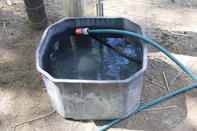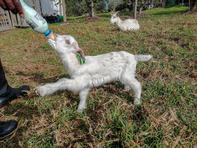Goats were never intended to be pen-raised animals. They prefer to roam free, selecting the best plants to eat, so confinement often leads to health problems especially in meat goats. Goats are adaptable and hardy but can stress easily and sometimes give up quickly when they are ill.

Goats are herd animals and hate being alone, so a goat standing on its own should be examined to see what is wrong. A goat that can't hold its head up, also cannot digest solid food and should not be force-fed milk, grains or feed. Food will remain undigested and this can complicate or prevent recovery.
If a goat cannot stand, sit it upright against a wall and roll it from side to side to ensure blood circulation and that any medication is distributed through its body. Fluids are essential. Electrolytes in liquid form should be provided. The farmer may give the right medications, but if the goat dehydrates, it is going to die.
When the goat is lying, ensure water is in a shallow container such as a dog’s water bowl. Sick goats need more water, energy and protein than healthy goats but they have a lower appetite. Encourage its appetite with small meals, moistening the feed and adding molasses or salt to make it tastier.
Fresh green forage and fresh leaves provide a good source of vitamins. A sick animal should have small amounts of concentrate feed 5 - 6 times per day and be fed separately from other animals to allow it to eat and rest undisturbed. Often, sick animals may eat more slowly and need more time to eat than healthy animals.
A problem with sick adult goats is that the gut flora can become unbalanced. Some farmers give unflavoured yoghurt, mixed with rolled oats or sweetened with honey, to help correct the gut flora.
How to Feed Sick Kids

For newborn kids, the immediate intake of colostrum (the first milk from its mother) is essential to its survival. If not, it will dehydrate quickly and die. To save a kid, the farmer must supply liquid in the form of colostrum from its mother or a colostrum replacer, not a colostrum supplement.
Dehydration is a major problem with diarrhea in goat kids so provide oral rehydration. Stop feeding all milk and milk replacer and replace it with an equal amount of electrolyte fluids. In an emergency, make a homemade electrolyte mix by boiling a litre of water and mix in 2 tablespoons of syrup, ½ teaspoon of salt and ¼ teaspoon of baking soda.
Please note: Information is for educational and informational purposes only and may not be construed as medical advice. The information is not intended to replace medical advice or treatment offered by your veterinarian.
By Marinda Louw